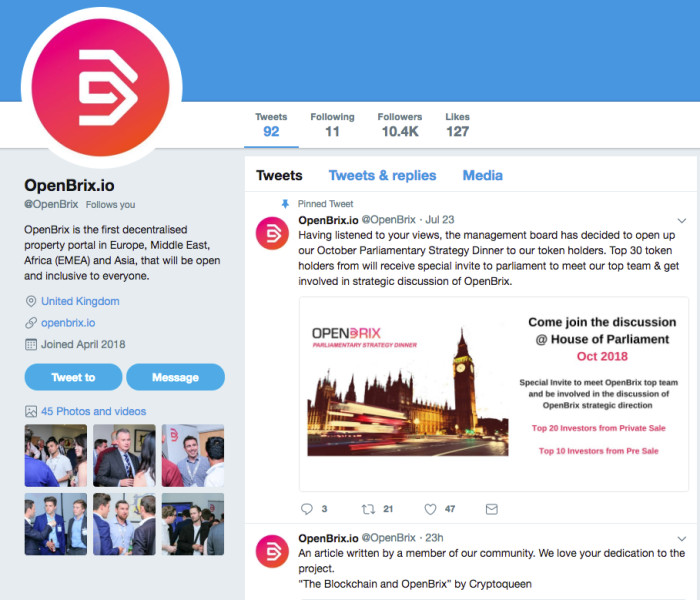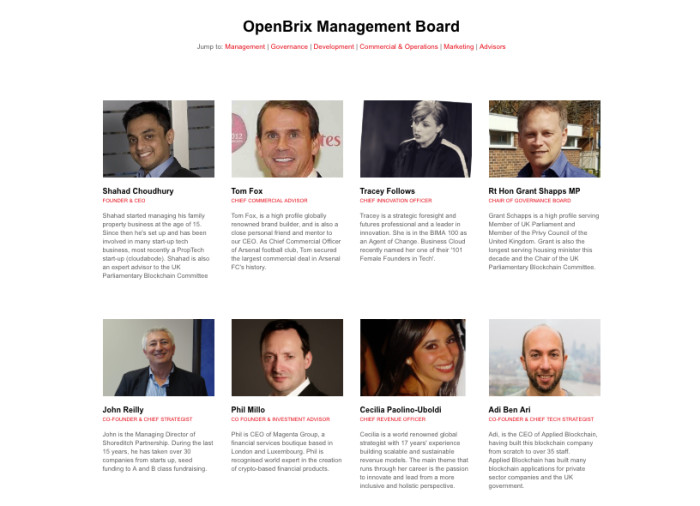Grant Shapps resigns from blockchain positions after FTAV discovers secret pay deal

Roula Khalaf, Editor of the FT, selects her favourite stories in this weekly newsletter.
Conservative MP Grant Shapps has resigned from two appointments related to blockchain technology, after FT Alphaville discovered a secret pay deal with a company run by a civil servant that had promoted itself through an event it said would be held in the Houses of Parliament.
Shapps, a former chair of the Conservative party until his resignation amid a 2015 bullying scandal, had been due to receive cryptocurrency tokens expected to be worth hundreds of thousands of pounds for his role advising the blockchain startup OpenBrix, ahead of a sale of tokens to the public, in what is known as an initial coin offering (ICO).
In the register of members' financial interests, the MP had listed this role as "unpaid".
Approached on Tuesday for comment about the lucrative advisory position and the accuracy of this disclosure, Shapps told FT Alphaville he was resigning from OpenBrix.
The MP also said he had stood down from his co-chairmanship of the All-Party Parliamentary Group on Blockchain, which he had set up last year with another Tory MP. He said, "I don't want to overstretch myself".
The dual resignations shine a spotlight both on the flimsy nature of rules that govern the intersection between business and politics in UK parliament, and also the role of APPGs in fostering little-noticed links between companies and legislators. Informal cross-party groups that have no official status within parliament, APPGs can appear in effect to function as lobby groups funded by companies with an interest in favourable policy outcomes.
A co-mingling of business and politics took place at the first "extraordinary meeting" of the Blockchain APPG, a group which has the stated aim of "ensuring industry and society benefit from the full potential of blockchain and other distributed ledger technologies". It brought together two of the four founders of OpenBrix, one of whom, Adi Ben-Ari, is a permanent "expert advisor" to the cross-parliamentary group.
They developed a plan for a "decentralised property portal" run on a blockchain that they hoped could challenge the duopoly of Zoopla and Rightmove for residential listings. Embracing the new -- and so far largely unregulated -- world of initial coin offerings, the team hopes to have raised $25m by the time the ICO closes in December.
The marketing for the ICO includes paying "Bounty Hunters" to promote it on social media, and includes a invtation to top investors to a "parliamentary strategy dinner", which until Tuesday morning featured as the "pinned Tweet" at the top of the Twitter page:

Shapps, who has previously attracted controversy for his involvement in get-rich-quick schemes, was roped in to sit on the advisory board as chair of governance, according to the company's founder. It appeared to be a role which fit with his enthusiasm for the tech, shown for instance by his telling a conference in June he had been mining Ethereum in his garage during a speech entitled "Building a Blockchain Britain".
Indeed, after we wrote about another MP's misguided enthusiasm for blockchain, he invited us to Portcullis house, telling us at a July 10 meeting that he was compelled to start the APPG after discovering just five references had ever been made in parliament to blockchain.
He appeared excited about the APPG's two-year programme, which had only kicked off in January.
Board meetings at the family restaurant
OpenBrix founder and CEO Shahad Choudhury -- a full-time civil servant working for UK Export Finance and a key speaker at the first APPG meeting -- told FTAV over the phone that he didn't understand why Shapps had felt he had to resign. Choudhury said the MP's contract hadn't required any further time commitment until after the ICO closes in December. After that, Shapps would be given his tokens and any further work would be paid.
Our conversation with Choudhury on Tuesday came a couple of hours after we had spoken to Shapps. He appeared to suggest our questioning provoked the MP's departure:
I got a call from Grant today who has resigned and relinquished any tokens that he could have got. He told our lawyer Martin [Donoghue], and Martin said I’m no longer to speak to you [the FT].
...To be honest, he [Shapps] had nothing to do until after the thing [ICO]... His main role was the governance role after we've got the money. He could have quite happily not done anything and he'd still be governance chair.
Over a long lunch on Friday of paneer curry and vegetable thali at his family's Bengali restaurant in Shoreditch, Choudhury and Phil Millo, one of four co-founders and a key financial backer, had filled us in on the details of the arrangement with Shapps.
Choudhury told us that Shapps had signed a consultancy contract for which he had already fulfilled his obligations: writing an article in which Shapps expounded on the potential of the blockchain for the property market, and attending an OpenBrix event. Choudhury and Millo also explained that the pool of tokens assigned to the advisory board Shapps sat on would be "roughly comparable" to that allocated to the co-founders: 8 million BRIX tokens. With each BRIX token worth 0.001 ether, or around 46 US cents at current rates, that's a pool of roughly $3.7m, or £2.8m.
The five advisers would not all be given exactly the same amount, we were told. Indeed chief commercial adviser Tom Fox, based in the US, had agreed to sit on the advisory board unpaid. Shapps and chief innovation officer Tracy Follows, however, would be paid the same amount, Choudhury said. We weren't told how much that would be but the roughly £2.8m would at that point have been shared among four advisers.
Here is what a webpage on the site looked like up until about 8pm on Tuesday:

Following up by phone on Monday night, Choudhury then told us there was a plan to reduce the total amount of tokens issued, meaning the co-founders and advisers would all get less. Again, he did not specify Shapps' remuneration, but there was a proposed pool of 8.2m BRIX tokens for 17 advisers and team members. Advisers, he said, would all get more than the mean.
So under the new proposal, which Shapps hadn't yet agreed to but which would pay him less than before, he could expect, at the very least, 482,353 BRIX tokens -- about £170,000 worth.
Sudden change of heart
The next time we spoke to Shapps was Tuesday morning. He told us:
I stood down as APPG co-chair... I’m also coming to the end of my advisory period with OpenBrix and am standing down from that as well. So I’m actually standing down from all the blockchain stuff.
Birgitte Andersen, CEO of the Big Innovation Centre, which provides the "secretariat" for the blockchain APPG, declined to say when she had been made aware of Shapps's resignation. When we had spoken to her on Monday morning, however, she had given no indication he might be about to quit.
It's unclear what Shapps meant by "coming to the end of [his] advisory period" at OpenBrix, given he had fulfilled his side of a contract that the founder had told us now made him entitled "by law" to payment. We asked why he was standing down when he was in line to receive hundreds of thousands of tokens. He answered:
Because life’s about more than that. I just want my time back... I’ll be forfeiting all of that because I won’t be there for when they actually do the fundraise.... I’m informing the registrar that my work’s finished on that as well — or my assistance. I’ve just known for the last few weeks I’ve had too many projects on at the same time, type of thing.
The position was registered on July 2, and Shapps went to the OpenBrix event he was contracted to attend on July 19th, 12 days before his resignation.
When we met Shapps three weeks before the resignation, he didn't mention OpenBrix, though he did tell us he held some cryptocurrency. But he also showed no signs then that he was intending to step down from the APPG. In fact, he seemed to suggest the work was only just starting. He said:
We haven’t produced anything yet… It’s why we haven’t been going to journalists on it.
We asked Shapps why he had listed the position at OpenBrix as an "unpaid" role, and he said that's what he had been advised to do "to the letter" by the MPs' registrar. The prospective financial gain would only be registrable if and when realised.
The biggest and the greatest and the most spectacular
Shapps wanted to paint himself as the person who had brought blockchain to the attention of parliament when we met him three weeks ago, telling us:
I started having a look at how many times it had been mentioned in parliament in Hansard and found there were five references. This was in September, maybe August last year. And not only that, but in three of them, it was just people using the phrase blockchain but not about the blockchain — it was really odd! ... it was kind of a really weird reference. And then the couple of other references were both to do with things like bitcoin and terrorists using it to subvert law enforcement basically. So it was all about not knowing your KYC stuff.
FTAV’s own search of Hansard found 15 references to the word "blockchain" before August 1st 2017 (and 11 references to "distributed ledger technology"). In none of these instances did it seem the term had been used out of context, nor used in the context of terrorism financing. Shapps had repeated this tale at the OpenBrix event on July 19, according to attendees.
The MP said on Tuesday:
Oh well it’s a long time ago. I can’t remember exactly the date I looked it up. But whenever I looked it up that was the situation at the time I guess.... I can’t go back in time and find references I found at the time I’m afraid. So look I don’t think there’s much more I can help you with I’m afraid. Maybe your search was better than mine.
Another claim by Shapps was that "literally 300 people" had shown up to some of the APPG's evidence sessions. On another occasion he said "every time we do an evidence session, literally hundreds and hundreds of people turn up". Andersen, however, told us that the biggest room any of the sessions had been held in was a room that seats up to 120 people. Another was held in a room whose capacity is 70.
This isn't the first time Shapps has appeared to have a dubious relationship with actuality. It emerged in 2015 that he had continued working for a marketing business for at least a year after becoming an MP in 2005 under the name "Michael Green", after he had denied having a second job on several occasions.
Unlike what readers of his Stinking Rich 3 were told they could expect back in 2006, however, it looks like Shapps will no longer be making a ton of cash by Christmas.
Related links:
Who said being an MP was a full-time job? - FT
Tories rally behind Grant Shapps over job overlap - FT
Building a blockchain Britain in Bloxwich, because ...? - FT Alphaville
Buy SEC tokens! Now! - FT Alphaville
Grant Shapps confronted over ‘Michael Green’ ID in 2012 - Channel 4
Comments